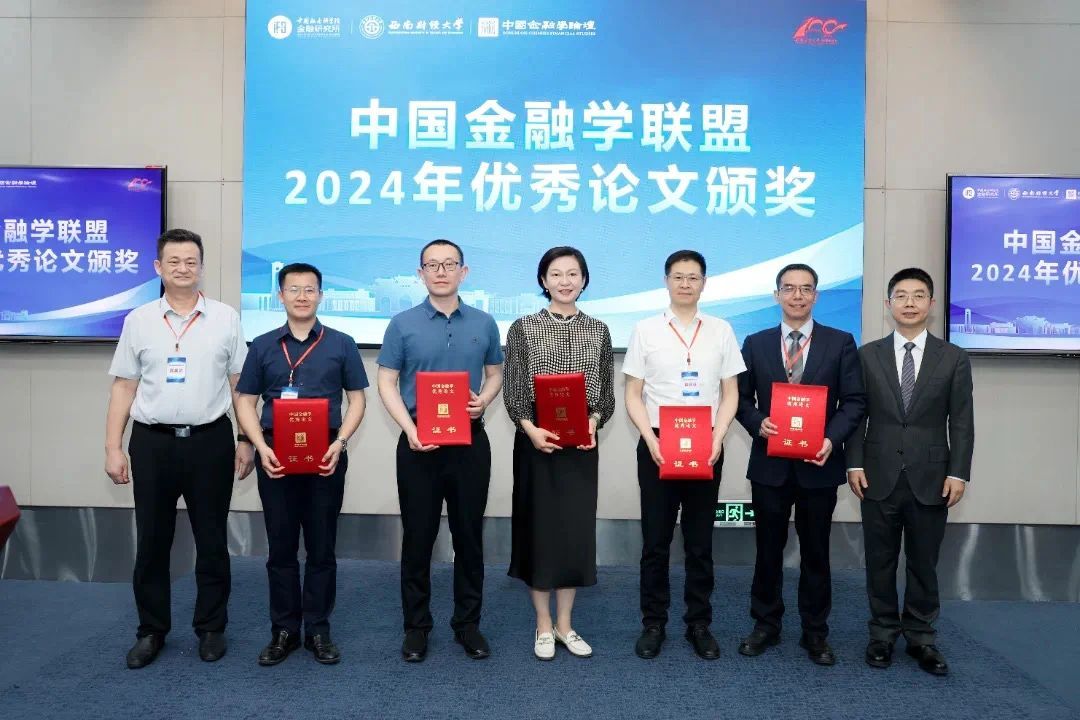Good News | Two Research Achievements from the School of Finance Awarded 2024 China Finance Outstanding Paper Award
On June 14, 2025, the 3rd China Finance Forum was successfully held at Southwestern University of Finance and Economics. The collaborative paper "The Construction of a Unified National Market and High-Quality Financial Development: A Study Based on Breaking Bond Market Segmentation" by Professor Yu Minggui, Dean of the School of Finance, along with Dr. An Jianfeng, Associate Professor Zheng Xinrui, and Professor Li Jinyang from Shenyang University of Technology; and the collaborative paper "Local Government Debt Swaps and the Divergence in Corporate Leverage Ratios: Implications for Optimizing Local Debt Structure" by Associate Professor Jin Ling, Dr. Wang Yingdong, and Professor Li Zhisheng from Southwestern University of Finance and Economics were awarded the 2024 China Finance Outstanding Paper Award.

It is reported that to thoroughly implement Xi Jinping's Economic Thought, accelerate the establishment of an independent knowledge system for China's finance, and contribute academic strength to building a financial powerhouse, the China Finance Alliance initiated the 2024 Outstanding Finance Paper Selection. Based on extensive submissions and through multiple rounds of rigorous review, the final winners—10 "China Finance Outstanding Papers (2024)" and 10 "China Finance Youth Outstanding Papers (2024)"—were determined by a vote among alliance members and announced at the 3rd China Finance Forum.
The Construction of a Unified National Market and High-Quality Financial Development: A Study Based on Breaking Bond Market Segmentation
Yu Minggui, An Jianfeng, Zheng Xinrui, Li Jinyang
Abstract: China's bond market primarily consists of the interbank bond market and the exchange bond market. Historically, most banks were restricted to investing only in the interbank bond market until August 2019, when they were permitted to enter the exchange bond market. This paper examines whether breaking bond market segmentation enhances capital market efficiency and promotes financial development, using the 2019 bank entry reform as a policy shock. The findings reveal that bank entry significantly reduced credit spreads in the secondary exchange bond market. Mechanism analysis indicates that bank entry improved bond liquidity and reduced information asymmetry, thereby lowering credit spreads. Furthermore, bank entry also decreased primary market credit spreads, reducing bond financing costs. Heterogeneity analysis shows that in the secondary market, credit spreads declined more sharply for bonds issued by private enterprises and small-to-medium-sized firms; in the primary market, bonds with stronger financial performance and higher credit ratings experienced greater reductions in credit spreads. Economic impact tests confirm that bank entry stimulated corporate investment. This study extends research on unified market construction and the determinants of bond credit spreads while providing theoretical and policy insights for further developing a national unified market, increasing the proportion of direct financing, and advancing high-quality financial development.
Keywords: Unified national market; Financial development; Capital market reform; Bond market segmentation; Credit spread
Local Government Debt Swaps and the Divergence in Corporate Leverage Ratios: Implications for Optimizing Local Debt Structure
Li Zhisheng, Wang Yingdong, Jin Ling
Abstract: To mitigate local government debt risks, China introduced a series of innovative reforms in 2014–2015 to transform local government financing mechanisms and enhance debt transparency, with debt swaps playing a pivotal role. This paper investigates how debt swaps affected the leverage ratio divergence between state-owned enterprises (SOEs) and non-SOEs. The results show that debt swaps led to a relative increase in non-SOE leverage ratios compared to SOEs, particularly among small and medium-sized enterprises (SMEs), firms with lower financialization levels, and regions with higher fiscal decentralization and more market-oriented credit allocation. Debt swaps alleviated the crowding-out effect of local government debt on non-SOE financing, increased bank credit supply, and reduced implicit guarantee expectations, thereby improving non-SOEs' financing environment and mitigating credit discrimination between SOEs and non-SOEs. Consequently, the leverage divergence was effectively reduced. The study suggests that comprehensive and full-cycle supervision of local government debt should be prioritized during debt management reforms. Optimizing local debt structure can address structural issues in credit resource allocation and support high-quality real economic development.
Keywords: Debt swap; Local debt structure; Leverage ratio divergence; Debt risk